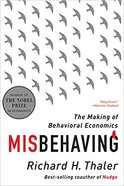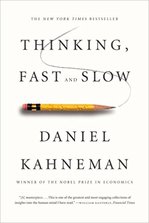|
On November 13, 2017, we began to work on our Mandate for Sustaining Democracy. We intend to create a plan of action for how to sustain democracy in all areas in which people function, including economics, education, the environment and of course, politics. Our conversation started with a quote from the book The Future of Democracy:
 We discussed the book Misbehaving (2015) by Richard Thaler, a University of Chicago Economist who just won the Nobel Prize. Thaler’s view is similar to that of Daniel Kahneman, the author of Thinking, Fast and Slow, that there are two sides to the human personality: (1) that which reacts automatically and (2) that which thinks things through, although Thaler approaches issues from an economist’s perspective. According to Thaler, “The core economic theory is that people choose by optimizing. Of all the goods and services a family could buy, the family chooses the best one that it can afford.” In other words, classic economic theory is based on the assumption that consumers are rational, or at least that the behaviors of individuals balance out, so that the results are prices and markets that are optimal and realistic.  Thaler and others in the field of Behavioral Economics challenge this view: “Humans have limited time and brainpower. As a result, they use simple rules of thumb — heuristics — to help them make judgments, and these judgments are often incorrect assessments that do not lead to the desired results.” We thus often are not rational in our economic (and life) decisions. We can be guided by our passions — including fear and greed — rather than thinking out what is the best action to bring us long-term results. One example: loss hurts more than gain so we will make decisions to limit losses, even when a different choice is likely to lead to a larger gain. Thaler discusses happiness (known as utility in economics), which increases if our efforts are reciprocal with others for the common good; if our motivation is competitive, then our happiness is based on the loss of others (as in most games). According to John Maynard Keynes, perhaps the most influential economist of all time, “emotions, or animal spirits, play an important part in individual decision-making.” Stock and home prices often reach unsustainable levels during bubbles. This is, in the words of Alan Greenspan, the result of “irrational exuberance,” or expectations that are not in line with a realistic assessment of what things really are worth. In the struggle between what Adam Smith calls our “passion” and “impartial spectator,” passion often is short-sighted. According to Thaler, “at any point in time an individual consists of two selves. There is a forward-looking “planner” who has good intentions and cares about the future, and a devil-may-care “doer” who lives for the present. Thus we often fail to look at the bigger picture of what works to reach our long-term goals. On the other hand, always being rational would take the spontaneity out of everyday living and life might be a lot less enjoyable. The trick is to balance the two.  How does all this relate to democracy? Democracy hinges on seeing the larger picture and working together toward a common vision — one beyond our own immediate passions and needs. In the words of Benjamin Franklin, “if we don’t hang together we will hang separately.” The US founders based the Declaration of Independence on the writings of the Enlightenment authors — including Locke, Rousseau, and Voltaire — and their ideas about justice and human equality. But often it is only in times of great stress that we, as a society, agree on common goals and determine how best to work toward them. Examples include our Revolutionary War, World War II, and the two most serious financial crises in our history, when people saw the need to come together to defeat a serious threat. At most times, however, we seem unable to overcome our individual viewpoints to arrive at a common understanding of our goals and how best to reach them.  We often are taught the importance of democracy in providing freedom, but rarely do we remember that freedom for each individual is built on creating a society that guarantees the freedom of all. The common good often is set aside under the label of “freedom” to allow a limited number of people to seek gain at the expense of others. Some people think that this is democracy, but the result actually is autocracy. Our leaders, and the constitutions they create, claim to promote democracy but instead may actually support a dominant minority. Thus we have continual discontent by those who believe themselves left behind, as reflected in the last US election. The first three words of the US Constitution, the first constitution of any democracy, are: “We the People.” To be real democracies, governments must strive to fulfill their promise to serve all the people, not just a few. How to Build a Democracy That Works for Everyone
The essential nature of democracy is the recognition of the desire for every human being for recognition and freedom. We cannot have freedom for some unless we commit ourselves to creating an atmosphere of freedom for everyone — this is the great insight of the authors of the American Declaration of Independence and Constitution and those who inspired them. For democracy to work, this commitment must be brought into every aspect of each society that considers itself democratic. This can be done despite the fact that people are imperfect. We eventually can move closer to a democratic society when we support each other in creating a world in which real people can move past their limits and still thrive. This is done by having a conversation with others — in our families, schools, organizations, and governments — about how best to identify and reach toward our goals. This brings out the best in every individual as we work together toward creating the society in which we want to live. We will continue our discussion of how best to bring democracy into the lives of all who live under its wing when we resume meeting on January 8. Contact Steve for the location if you want to attend. Please recommend this newsletter to people who you think might appreciate it. If you want to be added to the list to be notified when a new newsletter is posted, fill out our contact form and check the box just above the SUBMIT button. You may also use that form to be removed from our list. The Future of Democracy can be ordered wherever books are sold. Click ↓ (#) Comments below to view comments/questions or add yours. Click Reply below to respond to an existing comment.
0 Comments
Your comment will be posted after it is approved.
Leave a Reply. |
 5th edition now available 5th edition now available
Steve ZolnoSteve Zolno is the author of the book The Future of Democracy and several related titles. He graduated from Shimer College with a Bachelor’s Degree in Social Sciences and holds a Master’s in Educational Psychology from Sonoma State University. He is a Management and Educational Consultant in the San Francisco Bay Area and has been conducting seminars on democracy since 2006. Archives
July 2024
Categories |
 RSS Feed
RSS Feed